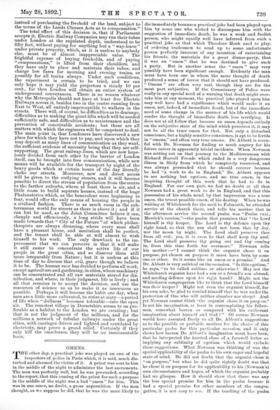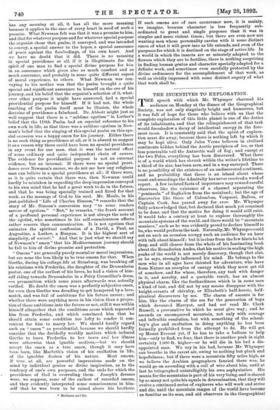OMENS. T HE other day, a practical joke was played on
one of the inspectors of police in Paris which, it is said, much dis- turbed and alarmed the victim of it. A priest was sent to him in the middle of the night to administer the last sacraments. The man was perfectly well, but he was persuaded, according to the report, that this coming of the priest for such a purpose in the middle of the night was a bad " omen " for him. This was in one sense, no doubt, a gross superstition. If the man thought, as we suppose he did, that he was the more likely to die immediately because a practical joke had been played upon him by some one who wished to discompose him with the suggestion of immediate death, he was a weak and foolish person, who might equally well have inferred from such a. practical joke as that which Theodore Hook used to play, of ordering tradesmen to send up to some unfortunate person perfectly innocent of any intention of entertaining his friends, the materials for a great dinner-party, that it was an " omen " that he was destined to give such a party. But in another sense the " omen " may very possibly have been significant enough. Evidently the man must have been one in whom the mere thought of death produced a sense of terror that it should not have produced. " Omens " are often very real, though they are for the most part subjective. If the Commissary of Police were really in any special need of a warning that death might over- take him at any moment, the practical joke played upon him may well have had a significance which would make it an omen, not, indeed, of immediate death, but of the immediate need of some change in the manner of his life which would render the thought of immediate death less terrifying. It does not at all follow that because an omen depends entirely on the subjective state of the mind which perceives it, it may not be all the truer omen for that. Not only a disturbed conscience, but a highly sensitive conscience, is apt to be fertile in "omens," and often very true omens. Dr. Abbott is scorn- ful with Dr. Newman for finding so much augury for his future career in apparently trivial incidents. When Newman was setting out on that journey to the Mediterranean with Richard Hurrell Froude which ended in a very dangerous illness in Sicily from which he completely recovered, and was always persuaded that be should recover because he had "a work to do in England," Dr. Abbott appears to see nothing but egotism, and no true omen, in the inspiring thought of this work that he had to do in England. For our own part, we feel no doubt at all that Newman had a great work to do in England, and that this possession of his whole mind by that impression was a true omen, the truest possible omen, of his destiny. When he was waiting at Whitchurch for the mail to Falmouth, he attended service at the church there, and tells his mother that in the afternoon service the second psalm was "Psalm cxxi., Merrick's version,"—the psalm that promises that "the Lord himself is thy keeper. The Lord is thy defence upon thy right hand, so that the sun shall not burn thee by day, nor the moon by night. The Lord shall preserve thee from all evil ; yea, it is even he that shall keep thy soul. The Lord shall preserve thy going out and thy coming in, from this time forth for evermore." Newman tells his mother :—" I cannot think the organist chose it on purpose, yet chosen on purpose it must have been by some one or other. So it seems like an omen or a promise." And Dr. Abbott is very satirical on the occasion. "Is this egotism,' he says, "to be called sublime or otherwise ? May not the Whitchurch organist have had a son or a friend's son abroad, and needing defence upon his right hand? Might not the Whitchurch congregation like to think that the Lord himself was their keeper ? Might not even the organist himself, for his own sake, be glad to remind himself that he was under the protection of One who will neither slumber nor sleep ? And yet Newman cannot think the organist chose it on purpose.' Is not his imagination, at least in contemplating his fellow- men, somewhat barren as compared with his exuberant imagination about himself and God ? " Of course Newman would have assented freely to all Dr. Abbott's suggestions as to the possible or probable motives for the choice of this particular psalm for this particular occasion, and it only shows how barren Dr. Abbott's imagination must have been, that he interpreted the hurried close of a farewell letter as implying any sublimity of egotism which would exclude these suggestions. What Newman was thinking of was the special applicability of the psalm to his own eager and hopeful state of mind. He did not doubt that the organist chose it "on purpose," but what he did quite rightly doubt was that he chose it on purpose for its applicability to his (Newman's) own circumstances and hopes, of which the organist probably had no glimpse. How it should show that there was any the less special promise for him in the psalm because it bad a special promise for other members of the congre- gation, it is not easy to see. If the teaching of the psalm
has any meaning at all, it has all the more meaning because it applies to the case of every heart in need of such a promise. What Newman felt was that it was a promise to him, and that for whatever purpose and for whatever special purpose the organist chose that psalm, it conveyed, and was intended to convey, a special answer to the hopes, a special assurance of peace against the forebodings, of his own heart. And we have no doubt that it did. There is no meaning in special providence at all, if it is illegitimate for the
spirit of one man to find a special divine purpose for him in an assurance which gives also as much comfort and as much assurance, and probably in some quite different aspect
of moral experience, to others. What Newman was con- veying to his mother was that the psalm brought a quite special and significant assurance to himself on the eve of his journey, and his belief that the organist's selection of it, what- ever other purpose it might have answered, had a special providential purpose for himself. If it had not, the whole teaching of the psalm itself must be illusion, the whole doctrine of providence a falsehood. Dr. Abbott might just as well suggest that there is a "sublime egotism" in Luther's
belief that the 118th Psalm had an especial reference to his own work in life, as that there was a sublime egotism in New- man's belief that the singing of this special psalni on this spe- cial occasion was a happy omen for his journey. Either there is no such thing as providence at all, or it is absurd to suggest it as a reason why there could have been no special providence in any event for one man, that it was the natural effect of some ordinary and quite independent chain of causes. The evidence for providential purpose is not an external evidence, but an internal. If there were no special provi- dence over Newman's career, we do not see how any religious man can believe in a special providence at all; if there were, as it is quite certain that there was, then Newman could hardly be mistaken in regarding the deep impression conveyed to his own mind that he had a great work to do in the future, and that be was being specially trained and fitted for that work, as the message of God to his soul. Mr. Moule, in his just-published "Life of Charles Simeon,"* remarks that the story of Mr. Simeon's conversion may "to some readers savour of egotism." "But," he remarks, "the frank account of a profound personal experience is not always the note of the egotist, who sometimes in his self-consciousness affects rather reserve than communication. It is not egotism that animates the spiritual confession of a David, a Paul, an Augustine, a Luther, a Bunyan. It is the highest sort of simplicity, of naivete." And that is just what we should say of Newman's " omen " that his Mediterranean journey should be full to him of divine promise and protection.
"Omens "are generally purely mental or moral impressions, but are none the less likely to be true omens for that. When Goethe, during his college life at Strasburg, was breaking off his relations with Frederika, the daughter of the Drusenbeim pastor, one of the earliest of his loves, he had a vision of him- self riding towards Drusenheim in a Privy Councillor's dress, —a premonition which some years afterwards was actually verified. No doubt the omen was a perfectly subjective omen, for even then Goethe was dreading to get hampered by a love- match, and was full of ambitions for his future career; and whether there were anything more in his vision than a projec- tion of these ambitions into the future or not, still it was within himself altogether that the conditions arose which separated him from Frederika, and which convinced him that he should attain some condition too lofty to render it con- venient for him to marry her. We should hardly regard such an " omen " as providential, because we should hardly consider that the decidedly worldly motives which induced Goethe to leave Frederika to her tears and her illness were otherwise than ignoble motives,—but we should accept the omen as a true omen, though it may have been born, like Macbeth's vision of his exaltation in life, of the ignobler desires of his nature. Most omens, if true at all, are powerful impressions made on the mind by individual genius or divine inspiration, as to the tendency of one's own purposes, and the ends for which the providence of God is overruling them. Joseph's dreams were, we suppose, some of the earliest of recorded omens, and they evidently interpreted some consciousness in him- self that he was born to be raised above his brothers.
• Methuen ani Co.
If such omens are of rare occurrence now, it is mainly, we imagine, because character is less frequently sub- ordinated to great and single purposes than it was in simpler and more violent times ; but there are even now not wanting men whose personality carries with it some distinct omen of what it will grow into as life extends, and even of the purposes for which it is destined on the stage of active life. In a world in which the insects are so minutely adapted to the flowers which they are to fertilise, there is nothing surprising in finding human genius and character specially adapted for a definite work, and sometimes even carefully protected by the divine ordinances for the accomplishment of that work, as well as vividly impressed with some distinct augury of what that work shall be.







































 Previous page
Previous page